
Oswaldo Mendoza Baca (August 5, 1908- April 9, 1962 in Cusco) was a Peruvian chemist and professor. He was particularly interested in genetics.

Oswaldo Mendoza Baca (August 5, 1908- April 9, 1962 in Cusco) was a Peruvian chemist and professor. He was particularly interested in genetics.
Oswaldo Mendoza Baca was born in the city of Cusco on August 5, 1908. He studied at the First Central Primary School in Cusco and the National College of Science in Cusco.
In 1929 he joined the Faculty of Natural Sciences, Physics and Mathematics at the National University of San Antonio Abad in Cuzco and graduated as a Bachelor of Science in June 1933 .
True to his alma mater, in 1933 he was appointed acting Professor of Inorganic Chemistry and Organic Chemistry in the Faculty of Science, just two months before graduating from BA . Thanks to a grant from the Spanish government he travelled to Spain, beginning in research under the direction of Dr. Angel del Campo. In 1937 he returned to Peru because of the Spanish Civil War, graduated from the University of Cusco.
On November 3, 1960, he was elected Dean of the Faculty of Chemistry at the University of Cusco, a position he held until his death in Cusco on April 9, 1962.
Notable publications include La Mecánica Ondulatoria, Colorantes Pre-colombinos and Leyes Genéticas de los Elementos Químicos, Nuevo Sistema Periódico (1954).
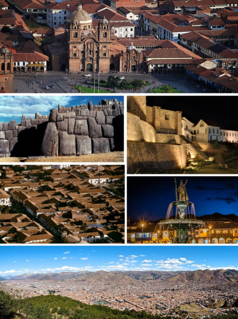
Cusco, often spelled Cuzco, is a city in Southeastern Peru near the Urubamba Valley of the Andes mountain range. It is the capital of the Cusco Region and of the Cusco Province. The city is the seventh most populous in Peru; in 2017, it had a population of 428,450. Its elevation is around 3,400 m (11,200 ft).

The National University of San Marcos is a public research university located in Lima, the capital of Peru. It is considered the most important, recognized and representative educational institution at the national level. At the continental level, it is the first officially established and the oldest continuously operating university in the Americas, which is why it appears in official documents and publications as "University of Peru, Dean University of the Americas". It had its beginnings in the general studies that were offered in the cloisters of the convent of the Rosario of the order of Santo Domingo —current Basilica and Convent of Santo Domingo— around 1548. Its official foundation was conceived by Fray Thomas de San Martín and the May 12, 1551 with the decree of Emperor Carlos I of Spain and V of the Holy Roman Empire, in 1571 it acquired the degree of pontifical granted by Pope Pius V with which it ended up being named as "Royal and Pontifical University of the City of the Kings of Lima". Being recognized by the Spanish Crown as the first university in America officially founded by Real cédula, it is also referred to as "University of Lima" throughout the Viceroyalty. Throughout its history, the university had a total of four colleges under tutelage: the Colegio Real y Mayor de San Martín and the Colegio Real y Mayor de San Felipe y San Marcos, the Real Colegio de San Carlos —focused on law and letters, derived from the merger of the two previous ones—and the Royal College of San Fernando—focused on medicine and surgery—. In the times of emancipation, it acquired a main role in the formation of several of the leaders managing the independence of Peru. After the proclamation of independence and during the republic, it maintains both colloquially and formally —in various treaties and documents historical—its name as "Universidad de Lima" until 1946, the year in which its current name and denomination as National and Major University were made official.

The National University of Saint Anthony the Abad in Cuzco (UNSAAC), also known as Saint Anthony University of Cusco or University of Cusco, is a public university in Cusco, Peru and one of the oldest in the country. Its foundation was first proposed on March 1, 1692, at the urging and support of Pope Innocent XII. The document in which Pope Innocent XII sponsored the founding of the university was signed in Madrid, Spain by King Charles II on June 1, 1692, thus becoming Cusco's principal and oldest university. The university was authorized to confer the bachelors, licentiate, masters, and doctorate degrees.

The National Agrarian University, also formally called National Agrarian University – La Molina (UNALM), is a public university in Lima, Peru. It is the country's best university in the fields of agricultural, biological, and forestry sciences and the only university in Peru offering degrees in meteorology. The university is organized into eight faculties which contain twelve academic departments. It is considered one of the most important higher education institutions of Peru.
Gary Urton is an American anthropologist. He was the Dumbarton Oaks Professor of Pre-Columbian Studies at Harvard University and the chair of its anthropology department between 2012 and 2019. Urton retired from Harvard in 2020, after multiple former students accused him of sexual harassment. Despite much controversy and opposition, he was given an emeritus title after retirement. Following internal investigation, Urton was stripped of his emeritus status by Harvard in June 2021.
An undergraduate degree is a colloquial term for an academic degree earned by a person who has completed undergraduate courses. In the United States, it is usually offered at an institution of higher education, such as a college or university. The most common type of these undergraduate degrees are associate degree and bachelor's degree. Bachelor's degree typically takes at least three or four years to complete. In some other educational systems, undergraduate education is post-secondary education up to the level of a master's degree; this is the case for some science courses in Britain and some long-cycle medicine courses in Europe. These degrees can be categorised as basic or first professional degrees.

Cayetano Heredia University is a private nonprofit university located in Lima, Peru. It was named in honor of Cayetano Heredia, one of the eminent Peruvian physicians of the 19th century. The university is overseen by a board of trustees (patronato) and is not owned by any private or state entity. It is considered one of the top medical schools in Peru, along the Faculty of Medicine "San Fernando" of National University of San Marcos, and is currently one of the major producers and publishers of scientific research in the country.

Oswaldo Luizar Obregón a Peruvian politician. He studied Physics. He is formerly a Congressman representing Cusco for the period 2006–2011, and belongs to the Peruvian Nationalist Party. He ran again in the 2016 elections, this time under the Fujimorist Popular Force, but he was not elected.
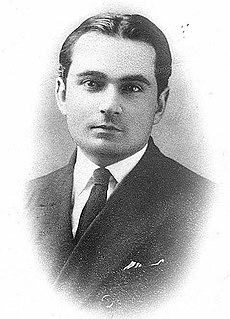
Jorge Alfredo Basadre Grohmann was a Peruvian historian known for his extensive publications about the independent history of his country. He served during two different administrations as Minister of Education and was also director of the Peruvian National Library.
A. Roberto Frisancho is a biological anthropologist and the Arthur F. Thurnau Professor of Anthropology at the University of Michigan. He is the 2008 recipient of the Franz Boas Distinguished Achievement Award in Anthropology bestowed by the American Human Biology Association. He is best known for his work on developmental human adaptation to extreme environments such as high altitudes, growth, anthropometry and evaluation of nutritional status. Specifically, he advanced the hypothesis and demonstrated that the origin of adult variability of biological phenotypic traits are function of the effects and adaptations to environmental conditions that the organism makes during the developmental stage. Within this conceptual framework, he has contributed numerous papers on bioenergetics, the nutrition and developmental determinants of pre-natal and post-natal growth including teenage pregnancy. In 2013, he received the Charles Darwin Lifetime Achievement Award bestowed by the American Association of Physical Anthropologists.

The Roman Catholic Archdiocese of Cusco is a Latin Metropolitan archdiocese with see in the city and old Inca imperial capital of Cusco, in Peru.
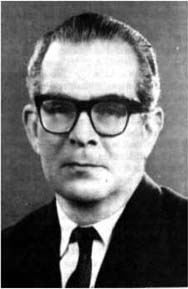
Dr. Juan de Dios Guevara Romero was a Peruvian chemist.
Julio Armando Guzmán Cáceres is a Peruvian economist, politician, and leader of the Purple Party who ran for President in the 2021 general elections getting just over 2% of valid votes. He was formerly the leader of the All for Peru political party, running for president for the party in the 2016 general elections, but was disqualified, due to the irregularities of the nomination process.

Verónika Fanny Mendoza Frisch is a Peruvian-French psychologist, educator, and politician. She is the founder and current leader of the New Peru movement.

Trinidad María Enríquez was a Peruvian teacher and student. After completing the only education available to her, she founded a school to teach other girls and complete the necessary requirements to enter university. Appealing to the president, she was granted the right to attend if an examination proved she was adequately prepared. Passing her review, Enríquez completed courses at the National University of Saint Anthony the Abbot in Cuzco, becoming the first Peruvian woman to earn a university degree in 1878. Though she graduated, she was denied a license to practice law and fought her case through the legislature and court systems until her death in 1891.
Cristóbal de Losada y Puga was a Peruvian mathematician and mining engineer. He was Minister of Education of Peru in the government of José Luis Bustamante y Rivero and Director of the National Library of Peru between 1948 and 1961.
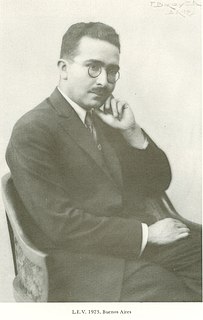
Luis Eduardo Valcárcel Vizcarra was a Peruvian historian, anthropologist, writer and activist. He was a researcher of pre-Hispanic Peru and one of the protagonists of the Indigenismo movement. He is considered the father of Peruvian anthropology, and his work focused on two fundamental axes: the revaluation of the Inca Empire and the vindication of the Andean culture. He brought awareness to the continuity that links the peasant of the Andes with the man of the Tahuantinsuyu.
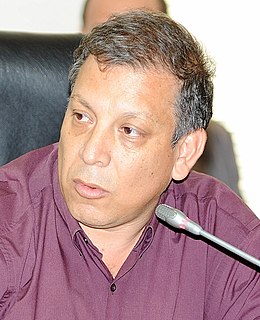
Marco Antonio Arana Zegarra is a Peruvian politician, sociologist, professor and former priest, founder and activist of the Tierra y Libertad Movement. He ran unsuccessfully for President in the 2021 elections, placing 16th.
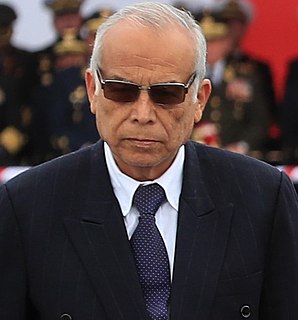
Aníbal Torres Vásquez is a Peruvian lawyer, jurist, and politician who has served as prime minister of Peru since 8 February 2022. Torres resigned from the premiership on 3 August 2022; however, his resignation was rejected by president Castillo, and Torres stayed on as prime minister. He was also Minister of Justice and Human Rights from July 2021 to February 2022 under the government of Pedro Castillo.